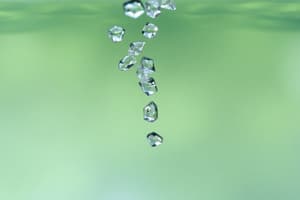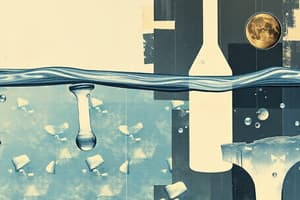Podcast
Questions and Answers
What is the primary cause of hard water?
What is the primary cause of hard water?
- Presence of sulfuric acid
- High levels of carbon dioxide
- Dissolved sodium ions
- Dissolved calcium or magnesium ions (correct)
Which compound forms when soap is added to hard water?
Which compound forms when soap is added to hard water?
- Magnesium sulfate
- Sodium hydrogen carbonate
- Calcium stearate (correct)
- Sodium sulfate
Which type of hardness can be removed by boiling water?
Which type of hardness can be removed by boiling water?
- Permanent hardness
- Both permanent and temporary hardness
- Temporary hardness (correct)
- Neither permanent nor temporary hardness
What is formed when calcium hydrogen carbonate is heated?
What is formed when calcium hydrogen carbonate is heated?
What is the main disadvantage of distillation as a method to remove hardness from water?
What is the main disadvantage of distillation as a method to remove hardness from water?
What is the role of washing soda in the context of hard water?
What is the role of washing soda in the context of hard water?
What type of resin is used in the ion-exchange method to soften water?
What type of resin is used in the ion-exchange method to soften water?
What is the chemical formula for calcium sulfate, a contributor to permanent hardness?
What is the chemical formula for calcium sulfate, a contributor to permanent hardness?
What is the purpose of rinsing the reagent bottle with deionised water?
What is the purpose of rinsing the reagent bottle with deionised water?
Which reagent is added to the sample to react in the redox process?
Which reagent is added to the sample to react in the redox process?
What is the indication that iodine has been released during the process?
What is the indication that iodine has been released during the process?
What is the total suspended solids concentration in p.p.m?
What is the total suspended solids concentration in p.p.m?
What is the purpose of using starch indicator during titration?
What is the purpose of using starch indicator during titration?
How should the concentrated sulfuric acid be added to the bottle?
How should the concentrated sulfuric acid be added to the bottle?
What does a high B.O.D indicate about the water quality?
What does a high B.O.D indicate about the water quality?
What should be calculated from the titration results?
What should be calculated from the titration results?
Which method is used to measure the concentration of heavy metal ions in water?
Which method is used to measure the concentration of heavy metal ions in water?
What causes eutrophication in water bodies?
What causes eutrophication in water bodies?
What measurement technique is used to estimate the free iodine in the solution?
What measurement technique is used to estimate the free iodine in the solution?
What is the purpose of keeping one bottle in darkness during B.O.D testing?
What is the purpose of keeping one bottle in darkness during B.O.D testing?
What is essential to ensure during the inversion of the bottle filled with the sample?
What is essential to ensure during the inversion of the bottle filled with the sample?
What does a low concentration of total dissolved solids indicate?
What does a low concentration of total dissolved solids indicate?
Which process is primarily used to remove heavy metal ions from water?
Which process is primarily used to remove heavy metal ions from water?
Why is monitoring oxygen levels in water essential for aquatic habitats?
Why is monitoring oxygen levels in water essential for aquatic habitats?
What is the main aim of sewage treatment?
What is the main aim of sewage treatment?
Which process is involved in primary treatment of sewage?
Which process is involved in primary treatment of sewage?
What role do bacteria play in secondary sewage treatment?
What role do bacteria play in secondary sewage treatment?
What does tertiary treatment primarily remove from sewage?
What does tertiary treatment primarily remove from sewage?
What is the principle behind colorimetry?
What is the principle behind colorimetry?
Which method is used to detect heavy metals in water?
Which method is used to detect heavy metals in water?
In the mandatory experiment, what is the purpose of adding ethanoic acid to the volumetric flasks?
In the mandatory experiment, what is the purpose of adding ethanoic acid to the volumetric flasks?
What is the primary outcome expected from the addition of sludge removed during sewage treatment?
What is the primary outcome expected from the addition of sludge removed during sewage treatment?
What ions are exchanged by the cation-exchange resin when treating hard water?
What ions are exchanged by the cation-exchange resin when treating hard water?
What happens to the Na^+^ ions in the cation-exchange resin after repeated use?
What happens to the Na^+^ ions in the cation-exchange resin after repeated use?
Which ions are removed by the anion-exchange resin in a mixed-bed resin system?
Which ions are removed by the anion-exchange resin in a mixed-bed resin system?
How is deionised water produced according to the content provided?
How is deionised water produced according to the content provided?
What characterizes distilled water compared to deionised water?
What characterizes distilled water compared to deionised water?
What is a disadvantage of hard water?
What is a disadvantage of hard water?
During the EDTA experiment for determining water hardness, what is necessary for rinsing the burette?
During the EDTA experiment for determining water hardness, what is necessary for rinsing the burette?
In the cation exchange reaction represented as RH + Na+ RNa + H^+^, what does RH represent?
In the cation exchange reaction represented as RH + Na+ RNa + H^+^, what does RH represent?
What causes hard water and how does it waste soap?
What causes hard water and how does it waste soap?
How does the ion exchange process soften hard water?
How does the ion exchange process soften hard water?
What is the effect of adding chlorine in excessive amounts to water?
What is the effect of adding chlorine in excessive amounts to water?
What is the purpose of adding a fluorine-containing compound in water treatment?
What is the purpose of adding a fluorine-containing compound in water treatment?
Why are heavy metal ions such as Hg^2+ or Pb^2+ a concern in water pollution?
Why are heavy metal ions such as Hg^2+ or Pb^2+ a concern in water pollution?
Which instrumental technique is typically used to detect heavy metal ion concentrations in water?
Which instrumental technique is typically used to detect heavy metal ion concentrations in water?
What is a common test for chloride ions (Cl^--^) in water?
What is a common test for chloride ions (Cl^--^) in water?
What is the biochemical oxygen demand (BOD) of a water sample?
What is the biochemical oxygen demand (BOD) of a water sample?
Flashcards
Hard Water
Hard Water
Water that doesn't easily form a lather with soap due to dissolved calcium (Ca²⁺) or magnesium (Mg²⁺) ions.
Temporary Hardness
Temporary Hardness
Hardness in water that can be removed by boiling, caused by calcium hydrogencarbonate (Ca(HCO₃)₂) and magnesium hydrogencarbonate (Mg(HCO₃)₂).
Permanent Hardness
Permanent Hardness
Hardness in water that cannot be removed by boiling, caused by calcium sulfate (CaSO₄) or magnesium sulfate (MgSO₄).
Temporary Hardness Removal Method
Temporary Hardness Removal Method
Signup and view all the flashcards
Distillation
Distillation
Signup and view all the flashcards
Washing Soda
Washing Soda
Signup and view all the flashcards
Ion-Exchange Resin
Ion-Exchange Resin
Signup and view all the flashcards
Water Softening
Water Softening
Signup and view all the flashcards
How does cation-exchange resin work?
How does cation-exchange resin work?
Signup and view all the flashcards
Replenishing the resin
Replenishing the resin
Signup and view all the flashcards
Deionised water
Deionised water
Signup and view all the flashcards
How is deionised water produced?
How is deionised water produced?
Signup and view all the flashcards
Difference: Deionised vs Distilled
Difference: Deionised vs Distilled
Signup and view all the flashcards
Hard water advantages
Hard water advantages
Signup and view all the flashcards
Total Suspended Solids (TSS)
Total Suspended Solids (TSS)
Signup and view all the flashcards
Total Dissolved Solids (TDS)
Total Dissolved Solids (TDS)
Signup and view all the flashcards
Biochemical Oxygen Demand (BOD)
Biochemical Oxygen Demand (BOD)
Signup and view all the flashcards
Why is a BOD test important?
Why is a BOD test important?
Signup and view all the flashcards
What causes eutrophication?
What causes eutrophication?
Signup and view all the flashcards
How does eutrophication harm aquatic life?
How does eutrophication harm aquatic life?
Signup and view all the flashcards
What are heavy metal ions?
What are heavy metal ions?
Signup and view all the flashcards
How are heavy metal ions removed?
How are heavy metal ions removed?
Signup and view all the flashcards
Primary sewage treatment
Primary sewage treatment
Signup and view all the flashcards
Secondary sewage treatment
Secondary sewage treatment
Signup and view all the flashcards
Tertiary sewage treatment
Tertiary sewage treatment
Signup and view all the flashcards
Activated sludge process
Activated sludge process
Signup and view all the flashcards
What is AAS used for?
What is AAS used for?
Signup and view all the flashcards
What is colorimetry used for?
What is colorimetry used for?
Signup and view all the flashcards
What is the principle of colorimetry?
What is the principle of colorimetry?
Signup and view all the flashcards
Eutrophication
Eutrophication
Signup and view all the flashcards
How does hard water waste soap?
How does hard water waste soap?
Signup and view all the flashcards
Ion Exchange Softening
Ion Exchange Softening
Signup and view all the flashcards
Flocculating Agent
Flocculating Agent
Signup and view all the flashcards
Chlorine's Role in Water Treatment
Chlorine's Role in Water Treatment
Signup and view all the flashcards
Excessive Chlorine: The Problem
Excessive Chlorine: The Problem
Signup and view all the flashcards
Heavy Metal Pollution
Heavy Metal Pollution
Signup and view all the flashcards
Dissolved Oxygen Measurement
Dissolved Oxygen Measurement
Signup and view all the flashcards
What is the purpose of adding concentrated sulfuric acid?
What is the purpose of adding concentrated sulfuric acid?
Signup and view all the flashcards
Why is the bottle inverted repeatedly?
Why is the bottle inverted repeatedly?
Signup and view all the flashcards
Why is starch indicator used?
Why is starch indicator used?
Signup and view all the flashcards
Sewage Treatment
Sewage Treatment
Signup and view all the flashcards
How does the thiosulfate titration work?
How does the thiosulfate titration work?
Signup and view all the flashcards
What does 'p.p.m.' refer to?
What does 'p.p.m.' refer to?
Signup and view all the flashcards
Why is it important to measure dissolved oxygen in water?
Why is it important to measure dissolved oxygen in water?
Signup and view all the flashcards
Study Notes
Hardness of Water
- Hard water is water that does not easily form a lather with soap
- Hardness is caused by dissolved Ca2+ or Mg2+ ions in the water
- Soap reacts with calcium or magnesium ions in the water to form an insoluble compound (e.g., calcium stearate)
- Hardness is categorized as temporary or permanent
Temporary Hardness
- Temporary hardness can be removed by boiling the water
- It is caused by dissolved calcium hydrogen carbonate (Ca(HCO3)2) and magnesium hydrogen carbonate (Mg(HCO3)2)
- Boiling the water decomposes the carbonates into insoluble calcium carbonate (CaCO3) and magnesium carbonate (MgCO3), which precipitate out of the solution
- This removes the hardness-causing ions
Permanent Hardness
- Permanent hardness cannot be removed by boiling the water
- It is caused by dissolved calcium sulfate (CaSO4) and magnesium sulfate (MgSO4)
- Heating the water does not affect these salts; therefore, hardness remains even after boiling
- These salts persist in the water even after boiling
Methods of Removing Hardness
- Distillation: Boiled water, removing dissolved solids
- Washing Soda: Reacts with Ca2+ ions to form insoluble calcium carbonate
- Ion-exchange resin: Exchanges Ca2+ and Mg2+ ions for Na+ ions, which do not cause hardness. This is a cation exchange resin. This process needs to be replenished using Sodium Chloride
- Deionised water: Uses a mixture of cation and anion exchange resins. Cation resin removes positive ions (e.g., Ca2+), and anion resin removes negative ions (e.g., sulfate). This results in pure water (deionised) containing only H+ and OH- ions, which combine to form water.
Advantages and Disadvantages of Hard Water
- Advantages: Good for teeth and bones, better taste, good for brewing and tanning leather
- Disadvantages: Blocks pipes, leaves scale in kettles, wastes soap, produces scum
Water Treatment
- Screening: Removal of floating debris (e.g., branches, plastic bags).
- Flocculation: Small suspended particles are coagulated, forming larger particles for better sedimentation. This is done through use of flocculating chemicals (e.g., aluminum sulfate).
- Sedimentation: Water is passed into a tank to allow for maximum sedimentation. Larger particles settle to the bottom.
- Filtration: Water passes through beds of sand to remove remaining particles.
- Chlorination: Chlorine is added to sterilise water and kill harmful microorganisms.
- Fluoridation: Fluoride added to prevent tooth decay.
- pH adjustment: Adjustment of pH of the water to the optimum pH of 7.2. This is done by adding acids or bases as necessary.
Water Pollution
- Water Pollution affects the amount of oxygen in water which leads to safety of aquatic life
- BO.D. (Biochemical Oxygen Demand): The amount of dissolved oxygen consumed by biological activities in water over five days at 20°C. High BOD indicates low oxygen levels, which means a high level of microorganisms
Water Pollution- Eutrophication
- Excessive enrichment of water with nutrients (e.g., nitrates and phosphates)
- Causes excessive growth of algae and other plants, leading to oxygen depletion and harming aquatic life.
Heavy Metals in Water
- Heavy metals (e.g., lead, mercury) can have serious consequences for organisms and affect human health
- Atomic Absorption Spectroscopy (AAS) is used to detect heavy metals in water
Dissolved Oxygen
- Dissolved oxygen in water due to plants
- is necessary for aquatic life, thus requiring BOD tests
Studying That Suits You
Use AI to generate personalized quizzes and flashcards to suit your learning preferences.




